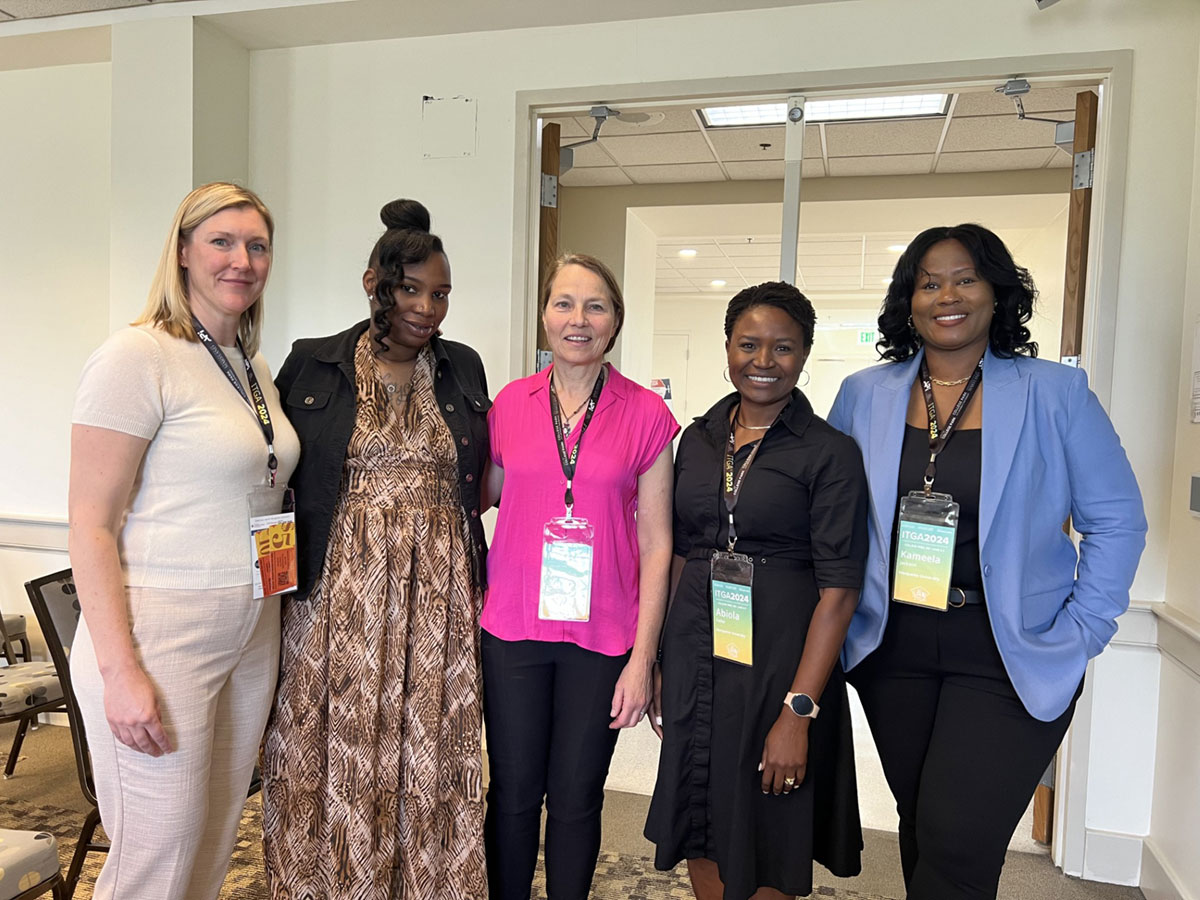Nursing professors play vital role in shaping Concordia 27 community center
Community-engaged research grows trust with Near West Side neighbors
By Andrew Goldstein | Marketing Communications Associate
When Drs. Kristin Haglund and Abiola Keller surveyed residents of Milwaukee’s Near West Side neighborhoods about their health needs, they might have expected to hear about the state of local hospitals.
Instead, residents brought up affordable housing, access to fresh food and vibrant social spaces. None of them have much to do with health care organizations, but all of them are just as vital to health.
“When we think about health, the more conventional view is to view it as something that is produced within the health care system, but we know that’s not the case,” says Keller, associate professor in the College of Nursing. “The majority of things that drive health actually take place outside of that system.”

Lindsey St. Arnold Bell, and Savannah Brooks from Near West Side Partners pose with Dr. Kristin Haglund, Dr. Abiola Keller and Dr. Kameela Jackson from the College of Nursing at the ITGA Conference in Washington D.C. (Names in caption listed from left to right in the photo.)
This approach informed the development of Concordia 27, a comprehensive community center that aims to improve equity, provide essential services and support the health priorities of Near West Side residents. The multi-use complex, which is located six blocks west of Marquette’s campus, includes resources such as 33 units of affordable housing, retail units for neighborhood businesses, a kitchen that produces thousands of meals for low-income families, and coworking spaces.
These amenities were born partially out of a concept mapping process conducted by Haglund and Keller. After surveying 165 people who lived or spent time in the Near West Side neighborhoods about what was needed to make the neighborhoods healthier, the two researchers grouped common answers and put them in order based on highest level of perceived importance.
The process yielded a clear picture of how Concordia 27 could help the community.
“It’s so important to partner with the community and ask them what their vision of health is,” says Haglund, professor in the College of Nursing. “People know what they need to support health for themselves and their neighborhoods, including things that may seem unrelated to health, like transportation.”
Community-driven insights made the process easier to navigate for Lindsey St. Arnold Bell, executive director of Near West Side Partners, a nonprofit neighborhood development organization of which Marquette is an anchor member. The project received public-private partnership funding from the State of Wisconsin, the federal government and Milwaukee County, among other sources, but that money had to be turned into development that reflected the community’s wishes.
“We needed to be sure that at every stage of the process, we could go to people who live here and say, ‘This is what we heard and this is what we came up with; does this feel right?’” Bell says.
The concept mapping project is one example of the College of Nursing’s intense focus on community-engaged research, a practice that involves partnering with groups of people who will be impacted by a project’s outcome. Faculty in the college are especially committed to research that addresses societal inequities, which are all too present in the Near West Side neighborhoods. Forty-six percent of NWS families live in poverty, while the 12.6 percent unemployment rate is roughly three times that of the city of Milwaukee.
27th Street is right in the heart of a dense and asset-rich neighborhood, and this project has opened up our windows and our doors to the community.”
Lindsey St. Arnold Bell, executive director of Near West Side Partners
“People in our college have a lot of experience with community-engaged research, and we hope that can be an asset for people.” Haglund says. “We identified this as a need we could help with. This work absolutely needed to be done and it was an opportunity to combine research that we love with a cause that we also love.”
“Work like this is aligned with the Marquette mission because we are training our students, especially those that will become health care providers, to be men and women for others,” Keller says.
The fruits of the multiyear process to bring Concordia 27 to life are evident to everyone who walks through its doors. Near West Side Partners staff occupy a glass-enclosed, street-level office on the corner; neighborhood residents visit often. The office is adjoined to the Fruition MKE Café, which serves coffee and breakfast sandwiches in a homey retail space. A maker space with industrial tools stands ready for local artisans to ply their trades.
Only the affordable housing units remain unfinished; St. Arnold Bell estimates that they will be ready for leasing in 2025. When they are full, the vision outlined in Haglund and Keller’s concept map will have been made fully manifest.
“Twenty-seventh street had a stigma attached to it for many years; people did not see it as a destination,” St. Arnold Bell says. “However, it’s right in the heart of a dense and asset-rich neighborhood, and this project has opened up our windows and our doors to the community.”
Keller wholeheartedly agrees.
“It has been a long time since we had something that had the potential to be a catalyst for change in the neighborhoods on this scale.”
